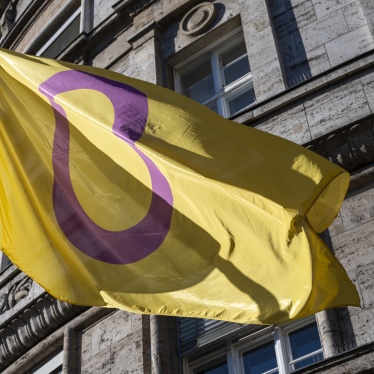The Minister of Justice of the Republic of Lithuania, Mr Juozas Bernatonis
Gedimino Ave. 30/ A. Stulginskio Str. 1, LT-01104
Vilnius, Lithuania
Request to grant equal rights to same sex couples in relationship legislation
Dear Mr. Bernatonis,
I write to you on behalf of Human Rights Watch. As you may know, Human Rights Watch is an independent international non-governmental organization dedicated to defending and promoting fundamental rights, working in over 90 countries around the world with offices in over 20 cities including in Europe, Amsterdam, Berlin, Brussels, Geneva, London, Moscow, Paris and Zurich.
We write in connection with the proposal of nine Lithuanian MPs representing the Social Democratic and Liberal party groups allowing a gender-neutral partnership registration in Lithuania. The proposal was registered on the 25th of March, 2015 and has been considered in the Seimas Committee on Legal Affairs. The Committee concluded that the proposal is consistent with the Constitution.
In a live TV debate on June 3rd, 2015 (Demesio Centre, LRT, LT) you said you want to introduce a bill that would only allow registered partnership for different sex couples, leaving out same-sex couples. As reason you gave that the ‘number of homosexual couples living together in Lithuania’ is ‘simply too low’ to include them in the upcoming partnership legislation.
We would like to express our extreme disappointment that you as Minister of Justice would exclude a part of the Lithuanian citizens from the partnership legislation. We emphasize that Lithuania’s human rights obligations require it to provide legal recognition and protection to same-sex relationships and their families, and not to discriminate on grounds of sexual orientation.
As a party to the European Convention on Human Rights (ECHR) and a member of the Council of Europe, Lithuania is bound by the rulings of the European Court of Human Rights. Last year, the European Court of Human Rights (Vallianatos and others v. Greece (GC), nos. 29381/09 and 32684/09, judgement November 7, 2013) found that proposed registered partnership legislation in Greece, which did not include same-sex couples, was discriminatory. The Court ruled that the Greek legislation was in violation of article 8 (family life) taken together with article 14 (prohibition of discrimination) of the ECHR. On June 10th, 2015 the Greek government announced it will introduce civil union rights to same-sex couples in a new law. The Court’s ruling also applies to Lithuania.
The Parliamentary Assembly of the Council of Europe has also recognized the importance of granting same-sex couples the same rights as opposite-sex couples in civil unions or registered partnerships. In Resolution 1728 (2010), the Assembly recalls that:
“…2. Under international law, all human beings are born free and equal in dignity and rights. Sexual orientation and gender identity are recognised as prohibited grounds for discrimination. According to the European Court of Human Rights, a difference in treatment is discriminatory if it has no objective and reasonable justification. Since sexual orientation is a most intimate aspect of an individual’s private life, the Court considers that only particularly serious reasons may justify differences in treatment based on sexual orientation. In its 1999 judgment in Lustig-Prean and Beckett v. the United Kingdom, it emphasised that negative attitudes on the part of a heterosexual majority against a homosexual minority cannot amount to sufficient justification for discrimination, any more than similar negative attitudes towards those of a different sex, origin or colour...”
Furthermore, the Parliamentary Assembly calls on all member states to:
“….16.9. ensure legal recognition of same-sex partnerships when national legislation envisages such recognition, as already recommended by the Assembly in 2000, by providing for:
16.9.1. the same pecuniary rights and obligations as those pertaining to different-sex couples;
16.9.2. "next of kin" status;
16.9.3. measures to ensure that, where one partner in a same-sex relationship is foreign, this partner is accorded the same residence rights as would apply if she or he were in a heterosexual relationship;
16.9.4. recognition of provisions with similar effects adopted by other member states;
16.10. provide the possibility for joint parental responsibility of each partner’s children, bearing in mind the interests of the children;…”
In the assessment of Human Rights Watch, any law regulating family and civil unions that excludes same-sex relationships from legal protection would violate the ECHR and fail to meet standards established by the Parliamentary Assembly of the Council of Europe.
In Recommendation CM/Rec(2010)05, the Committee of Ministers of the Council of Europe recommends that member states :
“…1. Examine existing legislative and other measures, keep them under review, and collect and analyse relevant data, in order to monitor and redress any direct or indirect discrimination on grounds of sexual orientation or gender identity;
2. Ensure that legislative and other measures are adopted and effectively implemented to combat discrimination on grounds of sexual orientation or gender identity:….
…23. Where national legislation confers rights and obligations on unmarried couples, member states should ensure that it applies in a non-discriminatory way to both same-sex and different-sex couples, including with respect to survivor’s pension benefits and tenancy rights.
24. Where national legislation recognises registered same-sex partnerships, member states should seek to ensure that their legal status and their rights and obligations are equivalent to those of heterosexual couples in a comparable situation.
25. Where national legislation does not recognise nor confer rights or obligations on registered same-sex partnerships and unmarried couples, member states are invited to consider the possibility of providing, without discrimination of any kind, including against different sex couples, same-sex couples with legal or other means to address the practical problems related to the social reality in which they live…”
On October 16, 2014 the European Commission for Democracy through Law (Venice Commission), the Council of Europe’s advisory body, criticized the scope of an amendment proposed by Macedonia , and said (in para. 98a of opinion 779/2014, from October 13, 2014) that:
“…insofar as the Amendment speaks of other forms of partnerships, it should not exclude providing to same-sex couples the same level of legal recognition as it provides to different-sex couples.”
Lithuania, as an EU member state and member of the Council of Europe, needs to respect the rights of LGBT people, without discrimination. Lithuania could follow the example of Croatia where the Croatian government introduced legal recognition of same-sex relationships in 2014. In doing so, Croatia is meeting its obligation to afford same-sex couples legal recognition and protection. Your proposal goes against the principles of equality and non-discrimination that are fundamental to what the EU stands for.
We look forward to receiving confirmation from you that the new partnership registration law will treat same-sex and opposite-sex couples and their families with equality, and would willingly discuss the law with you to ensure compliance with human rights standards.
We also urge you to consider joining with those EU states who have introduced marriage equality, providing same-sex couples equal rights to marry as opposite-sex couples. EU member states in this group are the Netherlands, Belgium, Spain, Portugal, Sweden, Denmark, Norway, Iceland, United Kingdom (excluding Northern Ireland), France, Luxembourg, Slovenia (approved by the parliament on March 3rd, 2015, but not into force yet), Finland (expected to come into force per March 1st, 2017) and Ireland (expected to come into force in the fall of 2015).
Yours sincerely,
Boris Dittrich
Advocacy Director
LGBT Rights Program








